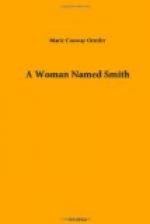We looked at the old bed, and seemed to see him there, trying to raise himself, crying out so piteously upon dead Richard’s name, only to fall back a dead man himself. What had he wanted to tell, as he lay there dying? His painted face in the library was not a bad man’s face. It was proud, stern, stubborn, bigoted; a dark, unhappy face, but neither an evil nor a cruel one. What was it that really lay between those two brothers? After more than a hundred years, we were as much in the dark as they in whose day it had happened and whose lives it had wrecked.
We built a fire in the long-disused chimney to take the dampness out of the room, and forced open the windows to let in the good sun and wind. Over in one corner, pushed in between the clothes-press and the side wall, was, of all things, a prie-dieu; and upon it a dusty Bible with his name on the fly-leaf. Nor was it a book kept for idle show; it plainly had been read, perhaps wept over by a tortured heart, for it fell open at that cry of all sad hearts, the Fifty-first Psalm. I was moving this prie-dieu, when my foot slipped on the bare floor and I dropped it with a crash. Fortunately it was not injured. But what had looked like a mere line of carving on the outer edge of the small shelf—rather a thick and heavy shelf now that one examined it carefully—had been struck smartly, releasing a cunning spring. There opened out a thin slit of a drawer, just big enough to hold a flat book bound in leather and stamped with two letters, “F.H.” On the fly-leaf appeared, in his own neat, fine script, “The Diary of Freeman Hynds, Esqr.”
The thing seemed incredible, impossible. His own daughter had evidently been unaware of the existence of this book, which he had not had time to destroy. And we, as by a miracle, had fallen upon it—and perhaps the truth!
It was written in so fine and small a hand as was only possible to the users of goose-quill pens; and this tiny, faded, brown writing on the yellowed pages covered a period of years. He had not been one to waste words. Once or twice, as we hurriedly turned the pages, appeared the name “Emily.” Mostly it seemed a dry, uninteresting thing, a mere memorandum, where a single entry might cover a whole year.
It was impossible for us to stop our work to read it then and there, or to do more than give it a cursory glance. We turned feverishly to those years that covered, as we figured, the period of the Hynds tragedy. And he had written:
This day was Accus’d Rich’d. my Bro. of robbing us of our Jewells. He protests he knows Naught & my Mthr. believes him as doth Emily. Has a true Heart, Emily. Horrid Confusion & my Fthr. Confound’d.
Impatiently I turned over the pages, raging to read the end, my heart pounding and fluttering.
Two nights since dy’d
Scipio, son of old Shooba’s wife, the
which did send for
me—
Thus far had I read, Alicia and I sitting head to head on the hall stairs. In came Schmetz the gardener, raving, gesticulating, and after him old Uncle Adam, stepping delicately, and with a placating smile on his wrinkled countenance.




